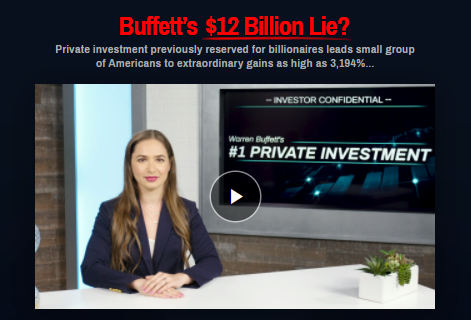Most of the teasers we see revolve around uncovering the latest and greatest stock, that financial gurus and newsletter writers tout will bring you outrageous returns if you buy them this instant.
What Dave Forest, from Casey Research, talks about in his latest marketing newsletter doesn’t have much to do with stocks but with another type of investment that even though it has existed for over 70 years, is often ignored by investors. At the beginning of his pitch entitled “Buffett's #1 Private Investment”, Forest says that two of Warren Buffett’s “most lucrative investments of all time” were not stocks but “a specific type of private investment” that he will uncover later. To find out more about these private investments, Dave Forest pitches one of Casey Research’s most popular newsletter investment programs: Strategic Investor for $49 per year. But keep it here, as we are going to tell you exactly what this “private type” of investment is for free.

Dave Forest is a former geologist who worked in mining and petroleum for more than two decades. He has since channeled most of his technical expertise into the finance and investment sector, originally joining the Casey Research group in 2004.
He served as Managing Director of Notela Resource Advisors, an advisory company focused on the analysis and design of global investment opportunities in the natural resource sector before he became a financial analyst with Casey Research. Dave Forest continues to travel extensively throughout Asia and Latin America, reviewing resource projects and new investment opportunities, especially in the natural resources sector.
The Opportunity
Unlike stocks that can soar up to 1,000% or slightly more within months, this special type of private investment can bring gains of up to 10,000% and become a game-changer for short-term speculators. According to him, these are not cryptos, options, IPOs, or Pre-IPOs but “actual companies producing real goods and services. They’re already bringing in cash.”
He goes on to mention that “you can buy them through your existing brokerage account… if you know the right code.” The type of investment he teases is part of many companies' capital structures – and the best part is, “they can give you much bigger returns than investing in a company's common stock.”
To catch your interest, Forest says that “Buffet's $12 Billion Lie” is regularly making these type of investments, which can and regularly do deliver 8,000% returns in just six months. So, what is the catch? According to the author, of the over 6,100 different stocks that are trading on both the NASDAQ and NYSE, only 5% have issued these types of securities. The reason why they are almost impossible to identify is that they have ticker symbols, similar to the ones stocks receive when they become publicly traded. Except that these securities all have an identifying letter in their tickers, such as a “W”, and it is the easiest way to identify them. Just like stocks, these securities are connected to real companies, “and they are even listed on the same markets that stocks trade on.”
These securities have been around for decades, but the reason why they aren’t very popular is that they are “created by the companies themselves and they’re issued directly to wealthy investors like Warren Buffett”. They also give you the right to buy a company's stock at a specific price and a specific date, and anything else that you would gain after selling the stock would be your profit.
They are even less complicated than other tradable instruments but the reason why they are less popular is that only a handful of companies choose to issue them and when they do, they are usually issued directly to a recipient. In other words, trading them as a small retail investor is hard to do, unless you know their specific ticker symbols.
So What Exactly is Being Teased Here?
Although the author doesn’t mention any specific company that issues these mandates, there are still some interesting pieces of information he shares, in his attempt to spread knowledge about the existence of these alternative securities and how regular investors and short-term speculators can benefit from them.
- The reason why some companies decide to sell alternative securities is that they require large capital, most probably to innovate through R&D or fund their growth, which is why you will see most such firms that are active in high-innovation fields like biotech, cryptos, semiconductors, marijuana or online gambling, and e-sports be issuers of this type of security. Sounds a lot like a list of teasers we have covered here in the past: Pfizer of Pot or $6 Semiconductor Company.
- They choose to issue them because they either “don’t want to go into debt by selling bonds” or directly issue new equity.
- Forest mentions that some of these securities can be as cheap as a penny and gives the example of Advanced Micro Devices (AMD), saying that “these AMD alternative securities did 15 times better than AMD stock”.
Ladies and gentlemen, the alternative securities Dave is talking about here are none other than Stock Warrants. He goes on to say that “warrants give individual investors a direct way to profit right from their existing brokerage accounts, with alternative securities that can cost a dime or less”. However, “like all investments, warrants carry risks”, so you should have at least some investing experience before trading in them. Besides, you still need to know the special “W” code in their ticker symbols, as they are not easy to find unless you have someone from “the inside” like the author.
Are Stock Warrants a Good Investment Opportunity?
Although Dave Forest doesn’t pump up any specific company's warrants and only talks about them in general. We can tell you that such securities are generally the domain of special situation investors and institutional traders, which is why you will not hear about them being talked about much on TV or be promoted to you by your regular broker.
The basic idea is that they entitle the holder to buy the underlying stock of the issuing company at a fixed price called the “exercise price” until the expiry date. They are also frequently attached to bonds or preferred stocks as a sweetener, allowing the issuer to pay lower interest rates or dividends. If you are already familiar with other equity derivatives such as stock options then you have a leg up, as these are similar in that you are basically speculating on the future price of a company's stock.
Needless to say, investing is already difficult and complex enough for most, that adding another layer of complexity to the equation, which is essentially what warrants do, is simply not worth the trouble. To take a page right out of Warren Buffett's book, focus on a business's underlying value and not on the quoted price of its stock…if you want a higher than average chance of profiting off your investments over the very long-term.
Quick Recap & Conclusion
- Dave Forest is a financial analyst and investment specialist who works with Casey Research. He has his own investment newsletter: Strategic Investor, which is sold for $49 per year. The price includes twelve issues of the newsletter, three profit reports, and a course on warrants and how to trade them, specifically targeted to beginners.
- In his latest marketing pitch titled “Buffett's #1 Private Investment”, Forest teases the opportunity of investing in warrants and talks about how much more profitable they are than buying regular stocks.
- Although he doesn’t mention any company, in particular, he says that only about 5% of the total public stocks traded on the NASDAQ and NYSE issue warrants and you will most likely find them among issuers in emerging fields, such as like semiconductors, marijuana research, biotech, and online gambling.
- Although stock warrants may seem like a promising exotic investment type to those that are newer to investing, in reality they are nothing more than an equity derivative which enables you to speculate on the future direction of a company's stock price – which is inherently unknowable.
What do you think about investing in stock warrants? Have you ever dabbled in derivatives trading before? Let us know what you think or if you have any questions in the comments section below.


I think the “W” is a very bullish investment. OXYundefinedWS or Occidental Petroleum Corp. @ $3.60 per share is a potential powerful position when the gas use is not going anywhere yet… considering (EV & AV) emerging technologies.
When the regular stock Price rises a little, the warrants percentage is valued way more exponentially.
Compared the two stocks prices… OXY vs OXYundefinedWS.
This guy above was on point with his post of Nov 18,2020. I checked the close of the warrant and it was at $3.60.
Noble prediction was Noble !
March 5, July 1 and October 11 Triple top touches on the Warrant. Sell your warrants now.
CL – Crude oil futures are topping by October 30- Nov 4 time frame…$90-93 ???
Point is it's heading down to $51-56 area first after this top. and then maybe lower?
Warrants are basically a long term option play. The longer the better when you buy low and 3.60 was low for Occidental warrants.
As is the key to making money in options is time and volatility. If you know where the price of the commodity is going you can make huge percentage gains on your option and even be 4-5-6-7 dollars from your strike price meaning way out of the money.
Let me make a Noble prediction(s ): This is the Futures markets
SI- Silver will top around 24.142-24.349 area by October 29. Between November 4-December 31, 2021 and may go into January 22 SI, meaning Silver should get down to $18-17 and maybe lower 15-16. One low target is $12-13 area which should see gold at 1450 area or lower.
DX – US dollar index will top out at 96.563-98.308 area by December 31, 2021 and may go into January 22. Then a sideways pattern should develop and then drop, drop, drop. The low is below the 71-72 low of 2008. Way below into 2023 and 2024.
Stocks – I don't do.
Noble was great with his Oxy prediction on his warrants. May I have his luck!!